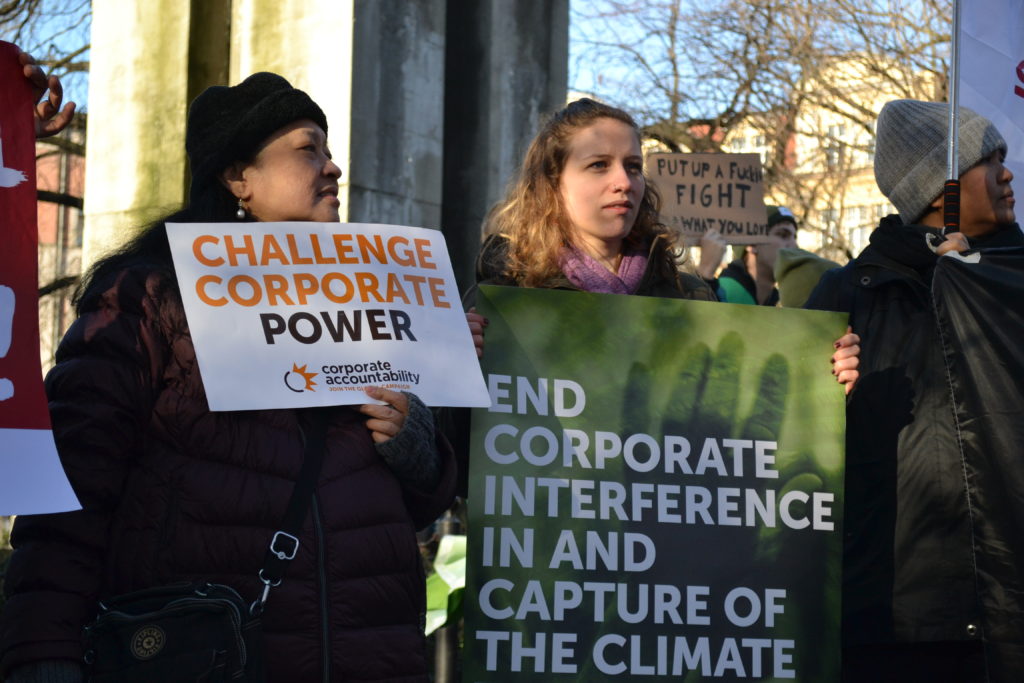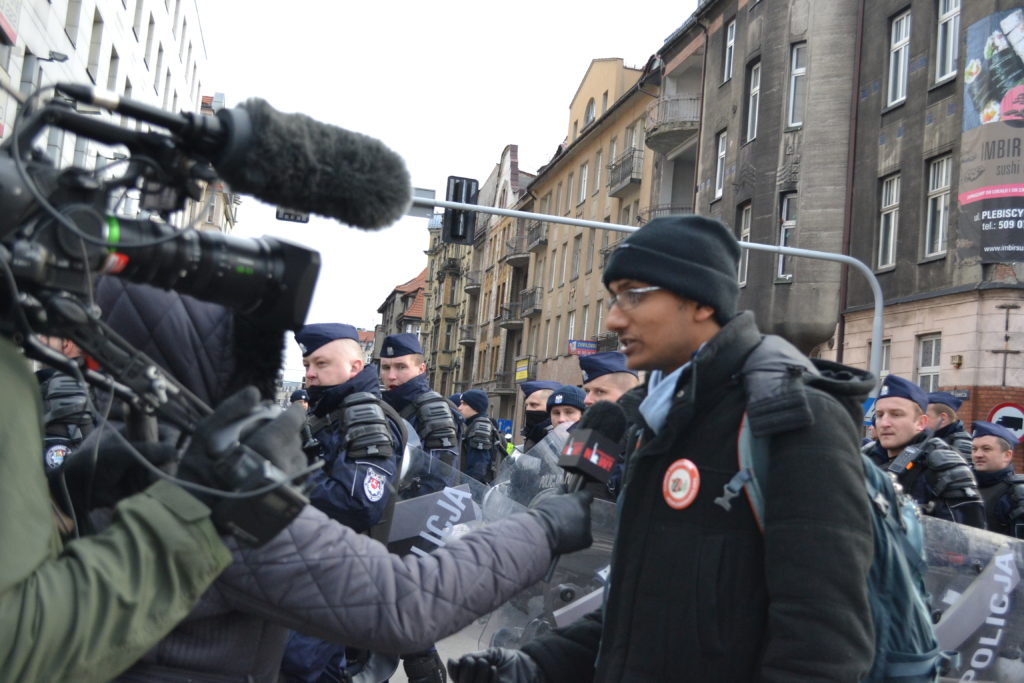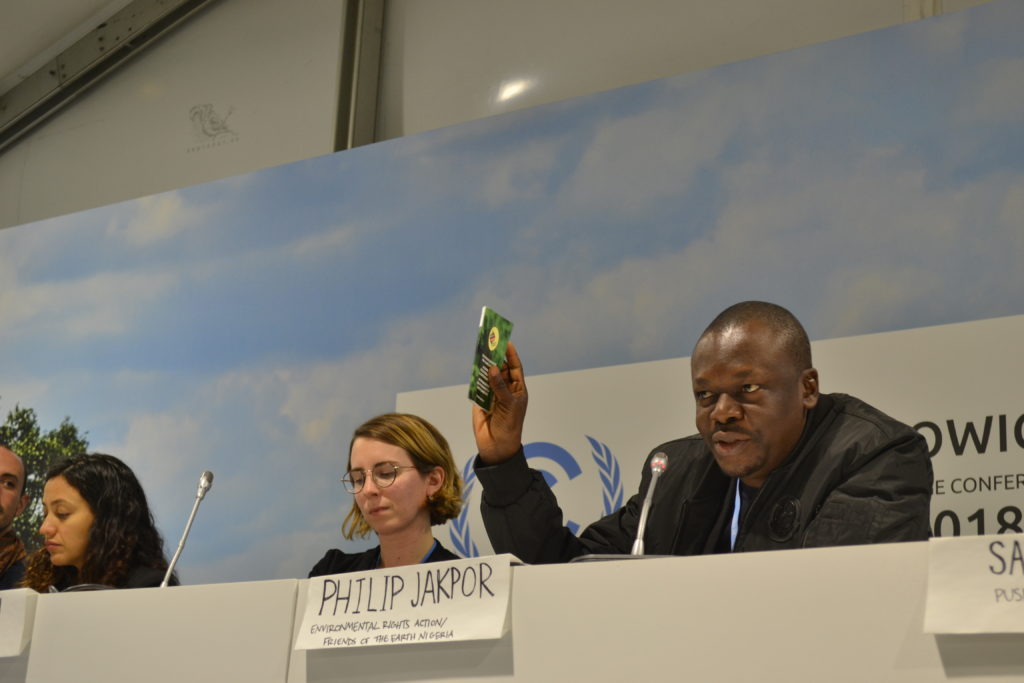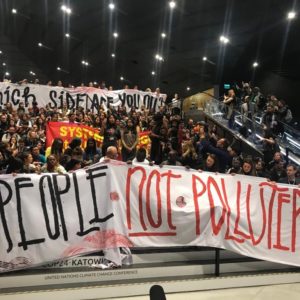We organized with all of our heart, soul, and brains going into this year’s U.N. climate treaty negotiations. Because that’s what Corporate Accountability does—we set out to achieve what needs to happen, even if it seems impossible.
But we don’t go alone. We go with deep relationships, in humility, following the leadership of those who are most affected by the actions of the transnational corporations doing the most harm. And this year, at these treaty meetings, this united global movement we are part of built enormous power behind the call to kick Big Polluters out. Together, we aimed for what seemed impossible: a roadmap that would actually require governments to implement solutions to drastically cut emissions and provide justice—in the form of financing and technology transfer, among other things—to countries and communities dealing with the devastating effects of climate change right now.
This unified movement exposing and removing the influence of Big Polluters has taken hold in ways we couldn’t even have dreamed of when we first started this campaign. And that gives me hope that although we didn’t get what the world needs in these particular meetings, if we keep going big, we will achieve the visionary climate policy the world urgently requires.

Lidy Nacpil of Asian Peoples Movement for Debt and Development (left) with Taylor Billings of Corporate Accountability at a large demonstration in the streets of Katowice, which took place at the midpoint of COP24.
But first, the bad news
The meetings failed to deliver the bold roadmap for climate justice that we aimed for. With their enormous power, the U.S. and other Global North countries advocated agendas that entrench the status quo, attempting to renegotiate core tenets of the Paris Agreement to shirk their historical responsibility and protect Big Polluters’ profits.
This outcome will have very real and harmful consequences, particularly for the Global South communities that have done the least to cause climate change. The people and communities who are already experiencing climate change’s harshest effects are urgently owed resources and funding from the countries and transnational corporations that have driven the crisis—and these meetings did not deliver on this need. But we’re not giving up.
We went big because that’s what the world needs. It’s what our Global South allies called for. It’s what our members and millions of people around the world demand. We went big because the fossil fuel industry and other Big Polluters are the most powerful industries in the world.

Sriram Madhusoodanan, deputy campaign director at Corporate Accountability, being interviewed by Democracy Now! as police in riot gear march past.
And in response to the power that we’ve been building over the past three years, Big Polluters also went big. The coal industry sponsored the talks. Oil-producing nations — led by the U.S. – wasted a whole lot of valuable time refusing to accept language that would “welcome” the latest U.N. climate report, which laid out just how dire climate change is. Shell even bragged about helping write the Paris Agreement. Big Polluters did not want a visionary movement by the people and of the people to loosen the decades-long stranglehold they have had over the U.N. climate treaty.
Cracking the stranglehold
But because we went big, the global climate justice movement made significant cracks in the corporate capture of this treaty process. In the face of deeply entrenched corporate power, we moved our campaign forward in a number of critical ways.
-
- We got real solutions on the table where Big Polluters wanted to advance only carbon trading schemes. The fossil fuel industry hoped to ram through market-based schemes as the only “solutions” for reducing emissions. To be sure, the industry heavily influenced the draft text. But Global South governments demanded options other than market-based ones be considered, which the industry and the U.S. did not want at all. In the end, negotiations for finalizing this part of the rulebook were extended until next year. That provides a critical opportunity for us and our allies to support Global South governments in making sure the rulebook centers real, just solutions to the climate crisis.
-
- We made tremendous progress on including safeguards against industry conflicts of interest. Global South governments fought through the final hour of these meetings to have text in the rules on carbon markets that would safeguard policy from industry conflicts of interest. The meeting ended without consensus on this section (as mentioned above) — and the chair recommended that the language in question be considered as a starting point in the negotiations next year. This simply would have been unthinkable just over three years ago when we started our campaign.
-
- The idea of holding the fossil fuel industry legally liable for climate change is gaining traction. Liability is one of the core components in our work to hold corporations accountable. We have critical opportunities ahead of us to move the onus of the responsibility for paying for the impacts of climate change onto the fossil fuel industry. That’s an essential issue for Global South countries, especially low-lying and island nations. We’re positioned to join with allies in jump-starting energy and attention to this core issue as we head into 2019.
- We created a seismic shift in how people — government officials, NGOs, the media — perceive the root of the climate crisis: Big Polluters stymieing true, just solutions. When we first entered the talks, people laughed at us for saying we need to kick Big Polluters out. Now, the world is laughing at the U.S. for propping Big Polluters up. And this narrative shift was particularly clear in the media coverage. From Agence France-Presse (one of the top three news wires in the world), to CNN, to The Nation, to The Intercept, to outlets in Spain and Nigeria and Malaysia and beyond, the movement for just climate solutions over Big Polluters’ profits was front and center. You can be sure this is a major pivot from the rosy media narrative that the U.S., Big Polluters, and other Global North governments are used to spinning.
We’ll keep going big

Philip Jakpor of Environmental Rights Action (right), Friends of the Earth Nigeria holds up the People’s Demands booklet at the official Fork in the Road UNFCCC side event.
All of this is only possible because the broad and deep movement for climate justice — in part represented by the People’s Demands for Climate Justice — is more united than ever before. It’s what The Nation described as the “new internationalism.”
At these treaty meetings, the People’s Demands echoed through the halls. Youth organizations centered the People’s Demands in an action they organized on “Business and Industry Day.” Indigenous and frontline communities led a shut down of the U.S. government’s coal sideshow, and also invoked the People’s Demands. And at the final sit-in on the last day, hundreds of people held two enormous banners as they blocked the steps to the negotiating hall: “Whose side are you on?” and “People, not polluters.” (See our running blog from COP24 for more details on these actions.)
We went big, and we didn’t achieve what the world needs. Yet. But what occurred on the world’s stage over the last two weeks in Poland makes clear that our only option is to keep going big. In the face of Big Polluters’ determination to maintain the status quo, people are choosing a different path: the path of climate justice. We — a global movement — are getting to the root of the problem. Our mandate moving forward is clear. We must keep our eye on the prize and hold firm to the knowledge that change comes fast and with profound consequences when we’ve laid the right groundwork.
The People’s Demands are on the rise, and this was just the beginning. Join us.







